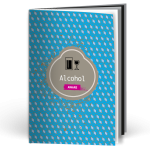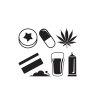Alcohol awareness, harm reduction & safety guide
This guide provides clear alcohol awareness advice, harm reduction strategies, and practical tips for safer drinking. Learn about the health effects of alcohol, ways to reduce risks, and how to make informed choices about drinking.
Alcohol is one of the most commonly-used drugs in the UK.
It affects individuals differently, depending on when and where you drink, who you’re with, and how you feel.
This information will help you identify the risks associated with alcohol and give advice on how to stay safe.
Alcohol awareness: what is alcohol?
What we usually refer to as alcohol is a chemical called ethanol, which is made through a process called fermentation.
During fermentation, yeast is combined with fruits or grains in order to convert the sugars into alcohol.
Spirits, such as vodka, rum, gin, and whiskey, are fermented and then filtered/distilled to separate the ethanol from water.
How alcohol works in the body
Your body absorbs alcohol into the bloodstream through the stomach and intestines. It’s broken down by the liver and expelled as urine at the speed of about one unit an hour.
While your liver works to break down the alcohol it can manage, the rest is circulated into your body and sent to your brain, where it depresses your heart rate and breathing and affects your brain's ability to control what your body does.
Initially, one or two drinks generally produce feelings of relaxation and cheerfulness, but any more can lead to blurred vision and coordination problems.
Drinking even more alcohol can lead to a loss of control, blurred/double vision, dizziness, wobbly legs, vomiting and even loss of consciousness.
The effects start within 15-20 minutes of drinking and can last a few hours, depending on how much you drink.
Stronger drinks (like spirits) and fizzy drinks (like alcopops) are absorbed quicker into the bloodstream and will affect you sooner.
How alcohol makes you feel depends on lots of things:
How quickly you drink it
Your liver processes alcohol at a steady rate no matter how quickly you drink. Drinking quickly increases the levels of alcohol in your bloodstream, making you drunker, faster.
How recently you’ve eaten
Food helps slow down the speed that alcohol is released into your system.
Your body weight
In general, the less you weigh, the more you’ll be affected by a given amount of alcohol.
Your mood before drinking
If you feel a bit down before drinking, it may make you feel even more depressed. If you feel angry, it can make you aggressive.
Sex
Women's bodies contain less water than men's, so alcohol is less diluted, meaning women feel the effects more than men. This is particularly true either just before or during a period.
Alcohol units and government guidelines
This section contains advice on units, the term used to describe the amount of alcohol, and therefore the strength of your drink.
A unit is defined as 10ml by volume, or 8gm by weight, of pure alcohol. Units are normally displayed on alcoholic packaging in a similar style to the label below
Government Guidelines
Government recommended safe drinking limits.
Unit guidelines are the same for men and women. Both are advised not to regularly drink more than 14 units a week.
Working out the units for yourself: Multiply the ABV by the total liquid (ml) and divide by 1000 12 x 750 ÷ 1000 =
Alcohol units in popular drinks
-
Can of lager:
500ml (Normal strength)2 units -
Bottle of strong lager:
330ml2 units -
Bottle of alcopops:
275ml1.4 units -
Pint of lager:
568ml (Normal strength)2 units -
Shot (Tequila, Sambuca etc):
35ml1.3 units -
Bottle of wine:
750ml9 units -
Glass of Wine:
125ml1.5 units -
Spirits (Vodka Whiskey etc.):
35ml1.4 units
Know your limits and recommended units
Guidelines for both men and women recommend drinking no more than 14 units a week to reduce the risk to your health.
The more you drink, the more your risk of developing a range of health problems (including cancers of the mouth, throat and breast) increases.
If you drink up to 14 units a week, spread them over a few days and include drink-free days.
There are no safe limits for young people: not drinking is the healthiest option.
Positive effects of drinking at ‘recommended’ levels
- Increased relaxation
- Increased sociability
- Possible reduced risk of heart failure*
*New evidence shows fewer heart health benefits than previously thought (primarily for women over 55 at around five units a week or less irrespective of the type of alcoholic drink).
Risks of drinking too much alcohol
Drinking over limits: short-term negative effects
- Low energy
- Accidents
- Injuries or violence
- Unplanned sexual encounters
- Problems with friends and families
Drinking over limits: long-term negative effects
- Alcohol dependence
- High blood pressure
- Liver disease
- Cancer
Warning signs of alcohol misuse
Different people react in different ways to alcohol. For some people, alcohol helps them relax and enjoy social occasions; for others, it might damage their health and personal life.
Signs that you’re developing an unhealthy relationship with alcohol:
- Finding it difficult to stop drinking once you've started.
- Neglecting work, college or school.
- People close to you worrying about the amount you drink.
- You’re taking risks when you've had a drink, such as driving a car or getting into fights.
- Drinking more than five days a week and more than nine units each time.
- You’re regularly thinking about when you can have your next drink.
- Being unable to enjoy yourself or relax without alcohol
- Getting involved in violence
If any of the above apply to you, you should consider cutting down. If a few of these apply to you, contact your GP for help and advice, or contact any of the organisations on the back page of this booklet.
The risks of alcohol and overdose
Getting hooked on alcohol
Regular use of alcohol can lead to tolerance: having to drink more and more to get the same effect. This can lead to physical dependence.
Mixing alcohol and other drugs
Mixing alcohol with other drugs, particularly depressants like sleeping tablets or heroin, is risky. The combination produces effects which are difficult to predict and can lead to an increased risk of passing out or death.
Overdose
Alcohol slows down breathing and heart rate. In large enough quantities, it can lead to loss of consciousness and even death.
Signs of alcohol overdose:
- Slow, shallow, or irregular breathing
- Confusion
- Difficulty awakening the person
- No reaction from painful stimuli (such as pinching)
- Unconsciousness (passing out)
- Blue-tinged skin or pale skin
- Seizures
If a person displays any of these symptoms, lie them on their side so they don't choke if they're sick, and call 999.
Alcohol and sex
Alcohol can affect your judgement and make you feel confused. You’re more likely to have unplanned sex when drinking, or sleep with someone you wouldn't have done had you been sober.
You’re also at risk of rape, sexually transmitted infections (STIs) and pregnancy.
Always use a condom during sex.
Alcohol and violence
Alcohol lowers your inhibitions, causing you to overreact in certain situations, which can lead to aggressive behaviour. It's not much fun waking up in a police cell with a hangover and a criminal record.
It might also lead to problems with your friends and family. Being drunk isn't much of an excuse if you say something that you regret the next day.
Being drunk makes you an easy target for robbery and assault. So don't flash your mobile phone, or any other valuables, around. Be aware of your surroundings.
Drink Driving
Driving while drunk or being in a car with a drunk driver is very dangerous both for you and other people in the car. You, your friends or a pedestrian could be seriously hurt or killed.
Staying safe when drinking
Passing out
As already mentioned, it’s possible to overdose on alcohol which can be fatal. If someone you’re with passes out, turn them onto their side so they can't choke on their vomit and ring an ambulance or find someone to help you.
Space your drinks out
Use soft drinks or water between alcoholic drinks. Your night will last longer, and it will stop you from getting dehydrated and reduce the effects of a hangover.
Don’t drink on an empty stomach
Food slows the release of alcohol into your system and helps to limit how quickly the alcohol affects you. Eating a meal before you go out or a snack while you drink is a good idea. You’ll have more energy to enjoy yourself!
Have smaller drinks
Some measures in pubs and clubs can be very large and have 2 or 3 units in each drink. Where possible, choose a smaller glass.
Have the day off
Give your liver a chance to 'detox' by having at least two alcohol-free days a week – this way, it has time to recover and repair itself.
Drinking before you go out
Drinking alcohol before you go out means you could already be drunk before you start your night out.
You’re more likely to be involved in accidents and violence, or be refused more alcohol at the bar.
Try to stick to one type of drink
Avoid mixing your drinks. This’ll help you keep track of how many units you've had and avoid mixing different strength drinks.
Mixing drugs and alcohol
Mixing alcohol with drugs, particularly depressant drugs, can increase the chances of an overdose and can make the effects of the individual drugs unpredictable and dangerous.
Getting help and support
If you feel your drinking is getting out of hand, consider talking to someone. Maybe a close friend, parent, teacher or a local advice centre.
Here are some organisations that can also help you:
Talk to Frank
National drugs awareness site for young people and parents/carers.
0800 77 66 00
www.talktofrank.com
Childline
Calls are free and confidential.
www.childline.org.uk
0800 1111
Addaction
UK - wide treatment agency, helping individuals, families and communities to manage the effects of drug and alcohol misuse.
www.addaction.org.uk
Brook
Free, confidential advice on sex for young people.
Call 0800 185 023 or
visit www.brook.org.uk


















